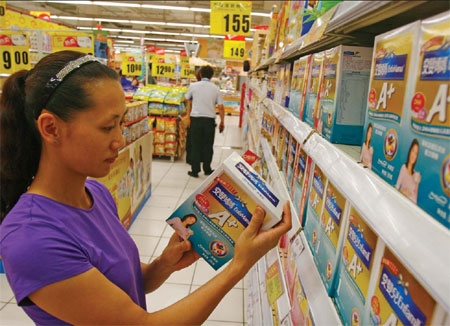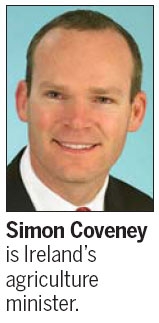Ireland relying on agri-food exports


China has strong demand for dairy product imports such as baby formula, especially since the 2008 melamine milk scare. [Provided to China Daily]
|
Chinese market could provide surge in dairy, pork products
Ireland is looking to increase its agri-food exports to China, with strong demand likely to see shipments grow by nearly 42 percent in 2020 from the 2007-09 average.
"China is an exciting market for the agri-food products that Ireland produces, like protein-based dairy products, meat and seafood," Simon Coveney, Ireland's agriculture minister told China Daily ahead of Chinese Vice-President Xi Jinping's visit to Ireland, which is Feb 18-20.
The two nations also have good potential for cooperation in the dairy industry. Dairy products already account for 30 percent of Irish agri-food exports, and are poised for considerable growth in 2015, when the European Union lifts its dairy quotas. Consequently, European farmers may produce an unlimited supply of milk for the first time in almost 30 years.
|

|
Food Harvest 2020, the ambitious government strategy document that sets out growth targets for the agri-food sector, is estimating a 50 percent milk production increase by 2020, which cannot be achieved without strong exports.
To illustrate the sector's reliance on exports, James O'Donnell, director of international markets at Bord Bia, the state body responsible for marketing Irish food and drink abroad, says: "Our cheese production is 300 times our domestic consumption and butter 1,000 times."
Already, private companies are leading the way in breaking into new markets.
"We want to expand in China and we are looking to employ more local Chinese," says John Jordan, marketing director at the Irish Dairy Board, which owns the world-renowned brand, Kerrygold.
IDB entered the Chinese market in 2006 with Kerrygold butter and cheese as well as dairy ingredients designed to the needs of Chinese companies.
To satisfy the taste of Chinese consumers, IDB has designed a range of slightly milder and creamier cheeses compared to the products it sells in Britain and Ireland, which contain more flavor.
Although only 10 million euros of the IDB's 1.9 billion euros production is currently exported to China, Jordan believes this will change with the launch of Kerrygold milk in China this April.
"There is demand from Chinese consumers for high-quality, grass-fed milk, especially from a brand they can trust. We believe that Kerrygold can fill this void," Jordan says.
One challenge Irish dairy exporters could face in the Chinese market is the higher tariff they will need to pay compared to their main rivals from New Zealand, which has a free trade agreement with China.
While acknowledging the challenge, Jordan says IDB will "provide something innovative to the Chinese customers" as a solution.
China's demand for imported infant formula is also fast rising since the outbreak of the melamine milk scandal in 2008. Most of the imports are from Ireland, Europe's largest infant formula maker, and maker of nearly 10 percent of the global output.
Today's Top News
- Xi calls for promoting volunteer spirit to serve national rejuvenation
- Xi chairs CPC meeting to review report on central discipline inspection
- Reunification will only make Taiwan better
- Outline of Xi's thought on strengthening military published
- Targeted action plan to unleash consumption momentum
- Separatist plans of Lai slammed






























